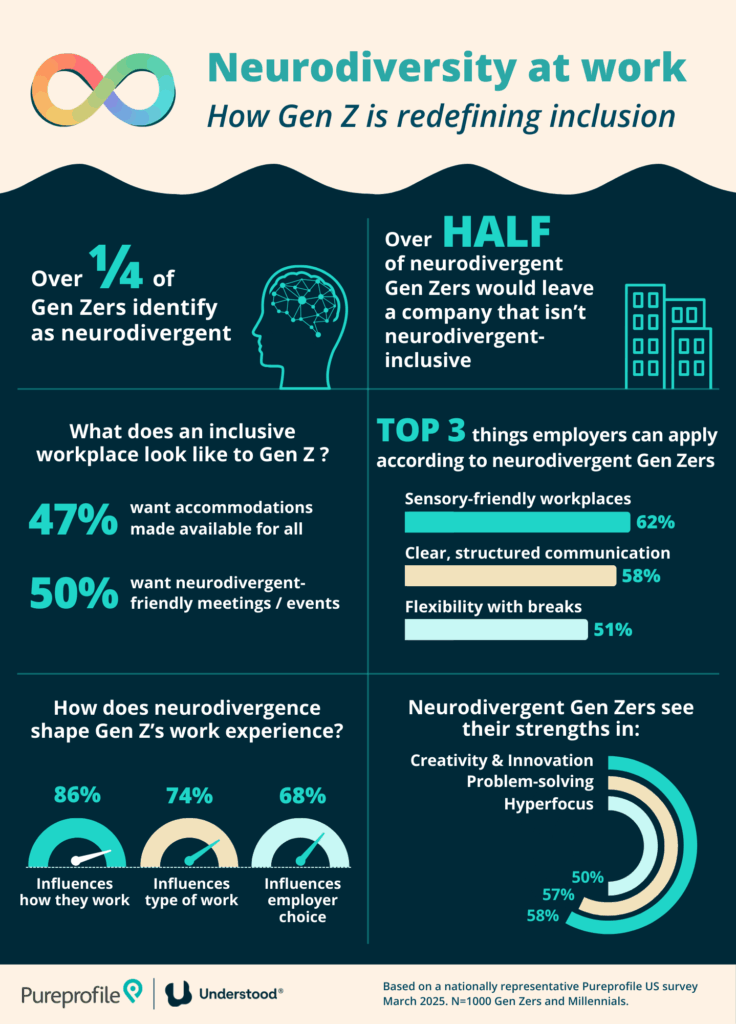As Gen Z steps into the workforce in growing numbers, and Millennials continue to shape it, they’re bringing new values around inclusion and flexibility. One area gaining attention is neurodiversity in the workplace, raising important questions about how employers can build environments that are truly supportive of different ways of thinking and working.
Understood.org, a leading nonprofit that empowers people across the US who have learning and thinking differences, partnered with Pureprofile to conduct a nationally representative study of 1,000 adults in the US (500 Gen Zers and 500 Millennials). The goal was to go beyond the headlines, such as claims that ‘over half of Gen Z is neurodivergent’ and uncover how neurodivergence shapes workplace choices, expectations, and experiences. While both groups offered valuable perspectives, the responses from Gen Z were particularly insightful.
Neurodivergence informs Gen Z’s career choices
Neurodivergence can be a central factor in how Gen Z engages with their careers and makes employment decisions. Our research found 26% of Gen Zers identify as neurodivergent, either ‘definitely’ or ‘somewhat’. More importantly, for those who are neurodivergent, this directly shapes their experience on the job.
86% say it influences how they work
74% say it shapes the type of work they do
68% say it influences the company they choose to work for
Inclusion by design, beneficial for all
Our study found that even Gen Zers who don’t identify as neurodivergent believe work environments should be more inclusive by default.
47% want accommodations to be made available to everyone, not just those who ask
50% want meetings, conferences, and events to be accessible and neurodivergent-friendly
This reflects a broader shift toward universal design, creating environments that are flexible, inclusive, and supportive for all employees, regardless of diagnosis or disclosure. Gen Z is sending a clear message: inclusion should be built in, not added on.
Why embracing neurodivergent talent matters
Neurodivergent Gen Zers identify a range of strengths, and many of those align with the skills businesses value. Among neurodivergent respondents, the top self-reported traits included:
58% Creativity and innovation
57% Problem-solving
50% Hyperfocus (productivity and expertise)
These traits are often linked to roles that require deep thinking, adaptability, and originality. As more organisations embrace inclusive hiring and actively seek these skills, recognising the capabilities that neurodivergent individuals bring can unlock talent and encourage valuable contributions.
How can employers support neurodiversity in the workplace?
When asked what specific actions workplaces should take to be more friendly to neurodivergent individuals, Gen Zers who identify as neurodivergent pointed to clear and actionable improvements:
62% Sensory-friendly environments
58% Clear, structured communication
51% Flexibility with breaks during the day
These are scalable changes that contribute to a more inclusive, supportive work environment for everyone and can have a huge impact. From layout and communication to daily routines, neurodivergent Gen Zers are asking for flexibility and structure that benefit both neurodivergent and neurotypical employees.
With 51% of neurodivergent Gen Zers saying they’d leave a company that isn’t neurodivergent-inclusive, employers who understand and accommodate these needs will be better positioned to attract and retain top Gen Z talent.
The findings make a compelling case for universal design in workplaces, conferences, and products. Neurodivergent Gen Zers want flexibility, clarity, and environments that support a variety of thinking and working styles. And when employers meet these needs, they create a workplace that works better for everyone, neurodivergent or not. Embracing a truly neurodiverse workplace culture not only benefits individuals, but also drives innovation, employee wellbeing, and long-term business success.
The infographic below represents key findings from the research:



